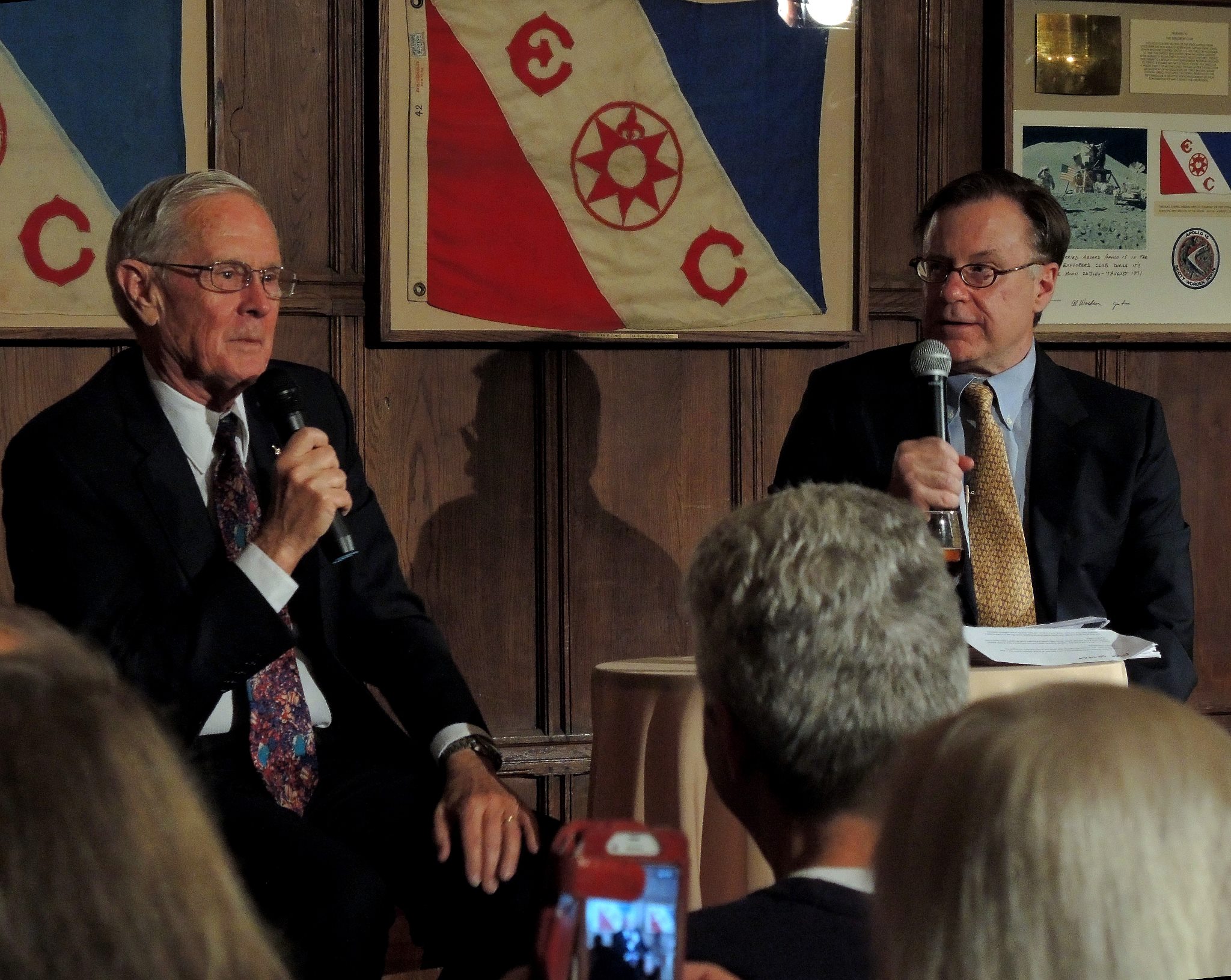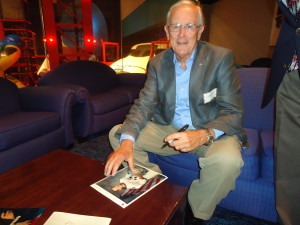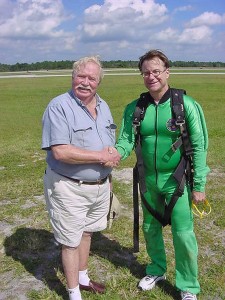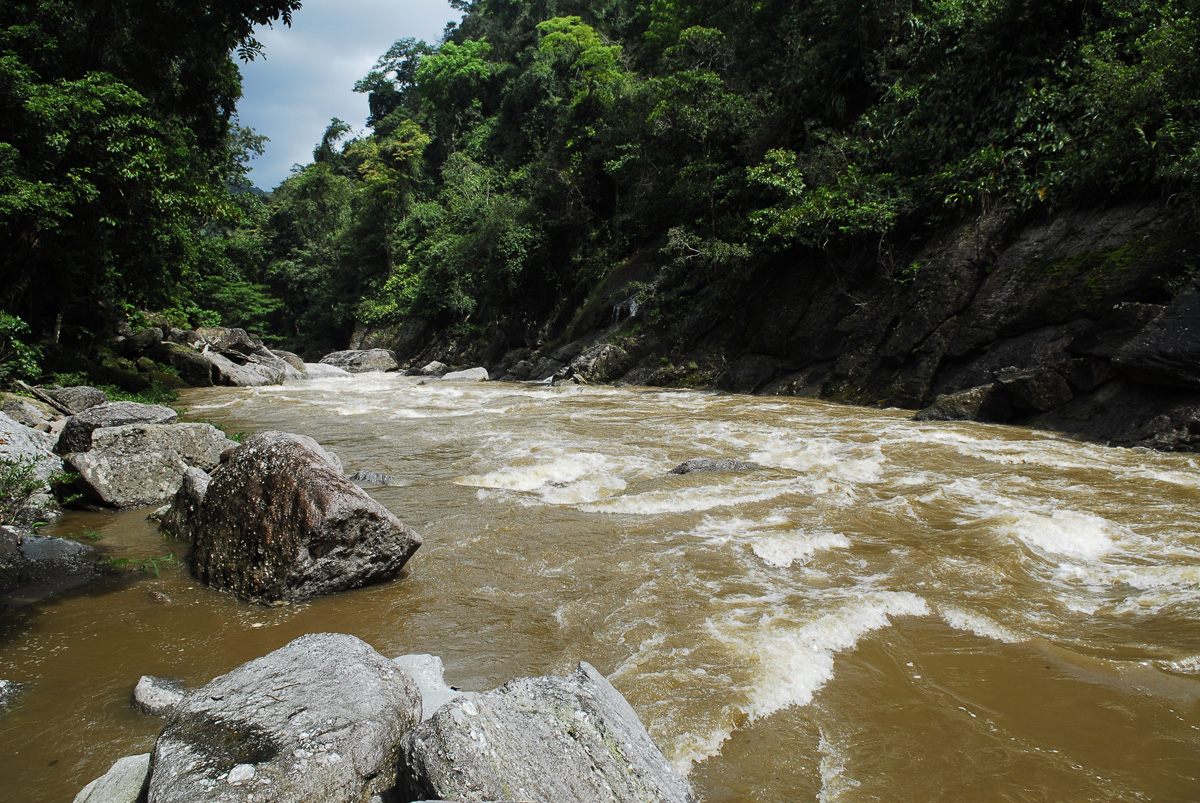James M (Jim) Clash has quickly become a favorite for my readers and requests come for more. So I am happy to once again offer you all a really unique article! This time an interview with the Apollo 16 Moonwalker Charles Duke! It is one of many really interesting interviews Jim has done in his second The Right Stuff Book, finally a hardcover, with the title “The Right Stuff: Interviews with Icons of the 1970s and 1980s,”. And for me, to get a perspective on life and earth like one gets whilst reading the book and this interview gives a feeling of the extra ordinary, something which only happens once or twice in life. But with the help of Jim´s easy-to-read but still profound interviews, it is available to all. They way it should be!
Interview: Apollo 16 Moonwalker Charles Duke
By
James M. Clash
As part of Apollo 16, Charles Duke became the 10th — and youngest —
man to step onto the lunar surface, just minutes after his crewmate
John Young. That was April 20, 1972 – 41 years ago.
In a way, though, Duke was famous even before he flew. As a mission
control specialist in Houston when Apollo 11 ran long on its landing
— barely reaching the lunar surface before using all of its fuel —
Duke deadpanned in a southern drawl, “Tranquility, we copy you on the
ground. You got a bunch of guys about to turn blue. We’re breathing
again. Thanks a lot!”
Duke, a former Eagle Scout and a member of The Explorers Club,
currently serves as chairman of The Astronaut Scholarship Foundation.
When I caught up with the retired U.S. Air Force brigadier general,
Duke talked bluntly about why we need to go back to the Moon before
tackling Mars, his disappointment that the U.S. is relying now on
Russia to ferry astronauts to and from the International Space
Station — even where he keeps his personal moon rock. He also
explained how a playful moment on the lunar surface nearly cost him
his life.
Jim Clash: Take us back four decades. What are your enduring lunar memories?
Charles Duke: The most vivid is the beauty: the stark contrast
between the brilliant gray of the Moon and the blackness of space. The gray
was so bright it was almost white — a sharp break between the surface and the
horizon. The sun was always shining, so you didn’t see stars or planets. You
could see Earth, but where we were — a little south of the center of the Moon
— it was difficult. Earth was directly overhead and, when I looked up, I saw
the top of my helmet (laughs)! When I look now at photos and videos taken, I
can remember landmarks like Stone Mountain and Red Crater — those kinds
of things. I also remember a lot about riding in the rover — John [Young] drove
me around. So yes, a lot of memories after three days up there.
JC: How about personal feelings?
CD: It was exhilarating. But as far as feelings, there was no spiritual or
philosophical experience — it was an adventure. I’m a test pilot who loves
exploration. My thoughts were: “What’s over the next ridge? What’s the next
experiment? There’s a rock over there we ought to get!” These are the kinds of
things that motivated me.
JC: Can you believe you were really there?
CD: Yes. It’s never seemed like a dream to me, and it was so awesome to
stand where nobody had ever been before — at least the area where we landed.
You could see the major landmarks you had to explore, so you felt right at
home. It was so exciting: “Man, I’m on the moon!”
JC: How about fear — any of that?
CD: No, not really, not from a standpoint of a problem with the spacecraft
not making it or, “Will we get back?” When you had thoughts like that it was
more, “What if it doesn’t work?” or “How do you get it going, how do you fix
it?” I did have one moment of fear having fun at the end of our stay. John and
I were going to do the Lunar Olympics and set the high-jump record. When I
jumped, I fell over backwards. And that was scary because the backpack is not
designed for impact, even at one-sixths gravity. It could have been
fatal. I could have broken the plumbing, the pumps, the regulator. If anything fails and you
lose pressure in the suit, you’re gone. So it was a scary moment. But
I was able to roll right and break my fall. You can watch me trying to get my balance in
the video, but finally I disappear behind the rover so Mission Control didn’t
see me hit the ground. My heart was pounding, I have to admit.
JC: Did you get to keep any of the rocks you brought back?
CD: Well, I got a lot of rocks with John. We collected a couple of hundred
pounds, but a personal one — no. NASA didn’t approve of that. We eventually
were given one with the provision that we had to give it to a museum or
university. I gave mine to my prep school, Admiral Farragut Academy in St.
Petersburg, Florida, and it’s still on display there. By the way, that
school has two moonwalkers — myself and Alan Shepard. There were two campuses back
then — in New Jersey, where he went, and in Florida where I went. They make
a lot of miles out of being “the prep school for moonwalkers!”
JC: We haven’t been back to the Moon since Apollo 17, and we don’t
even have our own transportation for astronauts to ISS. Thoughts?
CD: I am very disappointed that in 2010, when we decided to finish the
Shuttle, we canceled the follow-on, Constellation — a return-to-the-moon,
long-duration-stay, build-a-base program. Now we’re paying the Russians to
take us into space. We beat them like a drum during the Cold War. It is sad,
ironic really. Even the Augustine Commission said that if we don’t commit to
a space posture and goal, we’re going to lose our technological edge within a
decade. And I think that’s true.
JC: Some say go straight to Mars, others say back to the Moon first.
CD: I think my generation of astronauts is half on one side, half on the
other. Buzz Aldrin is “direct to Mars, we’ve been to the Moon.” I think to
develop the systems and spacecraft to go to Mars and stay for that [long]
duration, we want to do it on the Moon because we’re close enough to get
help. Once you get to Mars, you’re on your own. It’s “Hello Houston,” and [a
reply] comes back 12 minutes later! You’re basically independent out there. I
also think there are good scientific reasons to go back to the Moon.
Build a base like we have in Antarctica. It’s a great place to establish a
telescope. We started out with a UV camera for first observation of the heavens on Apollo 16, and
brought back a lot of information. We can learn techniques perhaps to extract
what [Apollo 17 moonwalker] Jack Schmitt says — the Helium 3 isotope — a
tremendous power source back here on Earth. You never know what we can
learn until you start doing it. So I’m for going to the Moon again, but I don’t
know whether we’re going to do that.
JC: As part of The Astronaut Scholarship Foundation, what advice do
you dole out to young people?
CD: Dream big and pick a career in a field that you will be happy in
and is challenging to you, especially the ones who want to be astronauts.
“I’d like to be an astronaut, what should I study?” You can study just about
anything — physics, engineering, science, math, medicine — and be selected.
A sociology degree won’t do it. You should pick something where, even if the
space program ended tomorrow, you would still be happy in your career.
JC: Be more interested in your passion than in making money?
CD: Well yeah, the money is not very good in the astronaut office. If you’re
looking to be a stockbroker or a Wall Street hedge fund manager, then an
astronaut career won’t do it.
JC: What floats your boat these days?
CD: I have a number of interests. I’m a lecturer, speaker — a motivational
kind of guy — and I enjoy that. I also do consulting as a board adviser on a
couple of small companies that are really exciting. And then my wife, Dottie,
and I are involved in Christian ministry, which is very satisfying. We travel
around the world. I’ve earned 3.2 million miles on Delta Airlines, which is six
times to the Moon and back, since frequent flier miles started there.
And that’s just Delta! This year alone, I’ll get more than 200,000 miles.
(Excerpted with permission from “The Right Stuff: Interviews with
Icons of the 1970s and 1980s,” by James M. Clash (AskMen, December
2012). To purchase on Amazon.com:
http://www.amazon.com/The-Right-Stuff-Interviews-ebook/dp/B00AM7O8E0
James M. (Jim) Clash is a seasoned adventure and business journalist.
Jim started at Forbes in 1993 as a reporter, and in 1996 was promoted
to staff writer. In 1998 he wrote a pivotal story on hedge funds,
warning investors of risks and expenses. When Long Term Capital
Management collapsed six months later, Forbes ran a national
advertising campaign “Business Reporting as Tough as Business Itself”
about his story, and he was promoted to associate editor. His book
“Forbes To the Limits” (Wiley, 2003) has received critical acclaim.
In June 2012, Clash’s first eBook, The Right Stuff: Interviews with
Icons of the 1960s was released.





That video of him trying to get back up having fallen over is amazing. The whole article is super interesting. Why haven’t we gone to the moon in decades? Why did we stop going?
Mikael, that is a very complicated and debated question, but basically once America beat the former Soviet Union to the Moon – and the Russians never responded – the Cold War space race was over. Personally I (and many others) wanted to keep it going, but the U.S. government stopped the program after Apollo 17, the flight just after Duke’s.